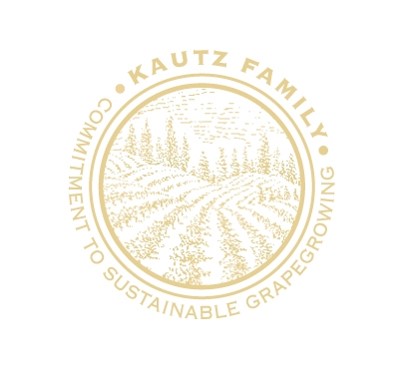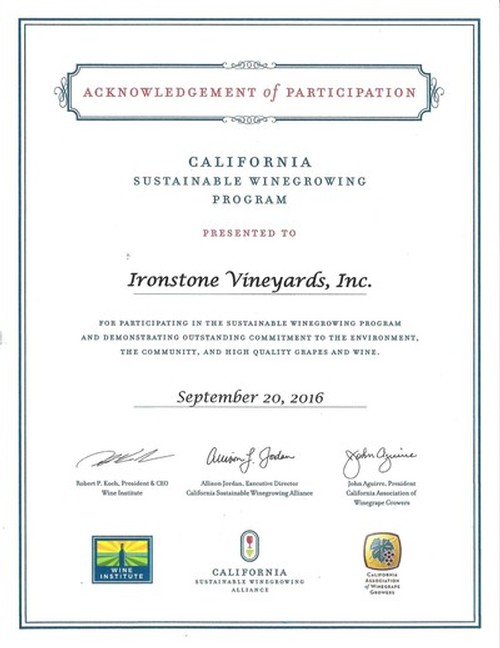Sustainable Agriculture
At Ironstone Vineyards, a healthy environment is important. By practicing Sustainable Viticulture, we are reducing water use, building healthy soil, and maintaining the surrounding wildlife habitat. 
There is an old time expression that the best thing a farmer can leave on their field is their shadow. This means that the farmer should have so little environmental impact on their field that it is seems as merely their shadow passed over their land. For Ironstone Vineyards, this means being out in the field, managing the vineyards and observing the best way to leave the smallest impression on our land.
Sustainable Viticulture is a comprehensive time-honored approach to vineyard management that involves all aspects of grape growing. This includes human resources, soil management, pest management, habitat management, and the wine making process.
Each year our vineyards face variations in weather, climate and pests. Ironstone Vineyards has a number of Sustainable Viticulture practices in place to combat any hazards that might come into play.
 Leaf Pulling
Leaf Pulling
This technique involves removing leaves around the grape clusters when the berries are about the size of a pea. This improves air circulation in the grape canopy, reducing the likelihood of rot. This practice also exposes grape bunches to sunlight which significantly improves winegrape quality.
Ironstone Vineyards plants cover crops throughout the vineyards. Cover crops help reduce evaporation of water, decreases soil erosion, allows haven to beneficial insects and organisms, and when the cover crops decompose, they add organic matter back to the soil.
Compost
Adding compost, grape pumice (the remains of the grape skins, leaves and steams after the pressing process) or manure to the vineyard soil, reintroduces valuable nutrients.
Owl Boxes & Raptor Perches
Placing owl boxes throughout our vineyards increase their habitation. Perches allow for hawks, falcons and like predators to scout for vineyard vermin. These magnificent birds are neccessary to naturally reduce the impact of gophers and voles which can cause extensive damage to the vines and their root system.
Drip Irrigation
Drip irrigation systems are beneficial in delivering water deliberately and more uniformly to the vines. Past practices in the industry included flood irrigation and the use of sprinklers. These poorly developed practices added to the over use of limited water resources. Drip irrigation lines can also be used to administer fertilizer and soil additives.
Riparian Habitat Restoration
Riparian ecosystems, the interface between land and water, are highly productive areas associated with creeks, streams, rivers and wetlands. They support more diverse and abundant wildlife populations. As caretakers of large portions of land, Ironstone Vineyards takes the responsibility to restore these valuable habitats which are incorporated into our vineyards. Through water bank stabilization, the removal of nonnative plants and the restoration of the natural flora, these habitats now provide safe haven for many creatures.
Reduced Pesticide Use
For years, Ironstone Vineyards has fervently strived to reduce their use of pesticides and herbicides. If applications of these are necessary, we use the softest chemicals and the lowest doses possible.
